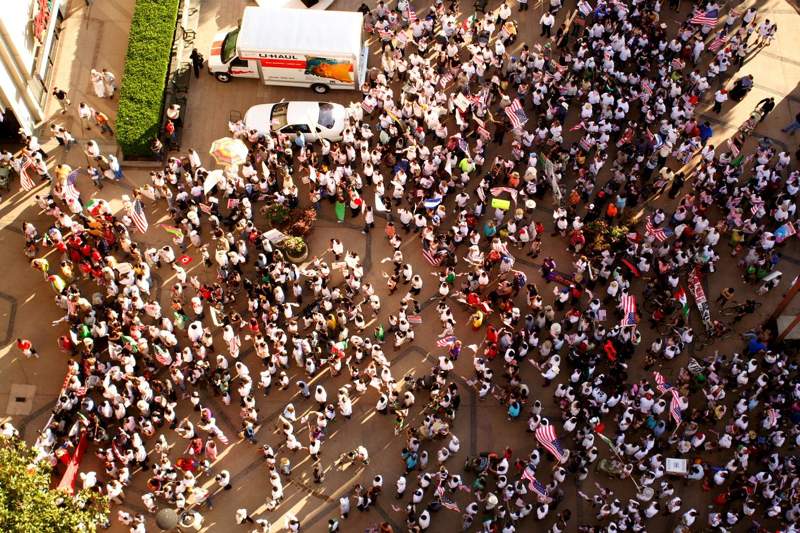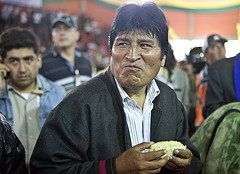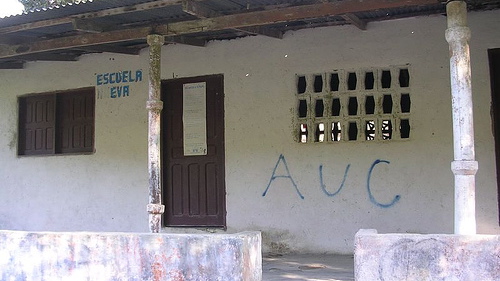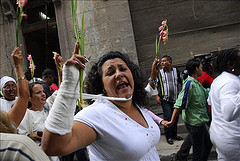
Dispatches, United States
Mobilizing for Comprehensive Immigration Reform in 2010; An Interview with Karina Claudio
March 18, 2010 By Jason Farbman
NEW YORK — On the campaign trail, President Barack Obama called for comprehensive immigration reform. A year and half later, with his domestic agenda faltering in the face of opposition to healthcare overhaul, immigration reform has fallen by the wayside; the subject received a scant one-sentence mention from Obama at his February State of the Union speech.
Immigration reform activists like Karina Claudio have not forgotten Obama’s promise. Claudio works as a community organizer for Make the Road NY, where she specializes in the group’s LGBTQ Justice Project. Make the Road NY was founded over a decade ago to work with low-income New Yorkers on issues including civil rights, health promotion, housing and environmental justice, workplace justice, and access to education. The group has offices in Queens, Brooklyn and Staten Island, New York.
The organization, which forms part of the New York Immigration Coalition, will join tens of thousands from around the country who are expected to travel to Washington D.C. on Sunday, Mar. 21 for the Mobilization for Comprehensive Immigration Reform. The New York Immigration Coalition has announced that immigrant rights groups throughout New York City hope to mobilize as many as 10,000 New Yorkers on 200 buses headed for the capital.
The organizers hope to capitalize on the flurry of activism that exploded on May 1, 2006, when millions of workers stayed off their jobs in over 200 cities, partly in response to proposed legislation that would have made undocumented immigration a felony. The bill passed the House of Representatives, but died in the Senate. Every year since, on May Day, the international workers’ holiday, hundreds of thousands take to the streets, joining the immigrant rights community in demanding more rights for working people.
Karina Claudio took some time to speak to the Latin America News Dispatch about the state of immigrant rights legislation and her work building links between groups who face intersecting forms of discrimination and injustice.
Interview with Karina Claudio
What are the goals of the national mobilization in D.C. on the 21st, both nationally and locally?
The goal is to mobilize 100,000 to pressure the Obama administration to pass a comprehensive immigration reform bill this year, 2010, to keep his promise. This happened after he made his state of the union speech. Folks are really mad because he breezed through the topic of immigration reform. So community organizations all over the country decided to not back down; we want him to deliver on his promises. This is where the whole idea of the march started.
On a local level our goal at Make the Road is to mobilize 42 buses and 2,000 people. Right now we have a total membership of 7,000 folks throughout NYC, so to mobilize 2,000 is a big, big goal. But it seems like we’re going to meet it. People are excited, information has been going around in newspapers and we’ve been getting calls like crazy this week and last with people wanting to reserve seats. It seems like we have more folks confirmed than we actually have buses!
Why do you think it’s important to mobilize nationally with a mass march, as opposed to lobbying or some different course of action?
I think to have folks there, telling their stories, showing their faces. A lot of folks are afraid to actually be vocal about this because they think that they risk being deported, risk being arrested. So I think the purpose of the march is to have a safe space for people to come out and talk about their stories and bring the issue into the public arena.
This past weekend there was a march in Chicago with 700 people, most of who were undocumented. Their main slogan was “Undocumented and Unafraid.” Have you seen a similar increase in confidence in your work in New York?
For our members, I feel like people are really excited to go and put a face to the problem and show it is real. To say, “I am a student and I graduated and got into college and paid for college out of pocket. Now I can’t get a job, even though I was top of my class and had awesome grades. I’m supposed to have the same opportunities other students have.” Or, “My partner is in Brazil and I can’t claim my partner. We’ve been together for however-many years and it’s not fair that heterosexual couples could easily get married and claim their partners as citizens or facilitate their path to citizenship.”
Obama was really open about talking about immigration while he was campaigning, and he made promises. A lot of immigrants mobilized, went out and voted for Obama thinking this would be the year for immigration reform. I think people are saying, “We supported you. Now we’re holding you accountable.” Folks are feeling tired, and that this is too much. Latinos are the second majority in this country. Not the first minority, the second majority.
At the Chicago rally, one undocumented worker made explicit reference to gay rights pioneer Harvey Milk, calling on immigrants to “come out… once and for all, break down the myths, destroy the lies and distortions.” You work on both these issues, how do you see the immigrant rights and LGBT movements intersecting?
We’ve been pushing the idea that without LGBT inclusion in immigration reform, we will not support it. We’re part of the NY Immigration Coalition and have been initiating conversations with the coalition asking them to take a position.
Right now, the bill that’s out there is the [Congressman Luis] Gutierrez (D-IL) bill, which does not include LGBTQ language at all. We were hoping it would include the Uniting American Families Act, which is the bill that would permit LGBT residents and citizens to claim their partners in terms of immigration. That was the minimum we were expecting and Gutierrez didn’t even include that.
It seems like [Senator Charles] Schumer (D-NY) is going to introduce another bill, and Schumer seems to be very supportive of the LGBT community. So we’re hoping with that bill will have LGBT-inclusive language. We’ll be pushing for that. We have two LGBTQ-only buses going from Make the Road, to assert a message that this is a strong part of the immigrant community. Even though some are not part of the immigrant community, they are coming because they support because it’s something that affects us all.
Both our communities are trying to get out this message in the public arena that we want to stop being second-class citizens and access full rights. There’s definitely an overlap in what we want from our government and from society. But there’s also an overlap in what’s happening to our communities: we’re constantly being policed, being targeted for hate violence and hate crimes, constantly being shut down and not granted full rights. We should be working together more.
My project at Make the Road definitely exists at the intersection of those two issues. We’re trying to get this idea out even to folks in our own organization, that in order to get support for each other’s movements we need to start working together. We can’t be saying we want LGBT rights but not supporting immigrant rights, and vice versa. Our communities have so many similarities, and folks who live in that intersection as well are particularly targeted. For example, trans women in Queens, who are sex workers, who are also undocumented and can’t access work. Who have to do sex work. They’re constantly afraid of police brutality and afraid of hate violence.
Make the Road actually exists at the intersection of so many issues. What guides your organizing?
Make the Road NY takes its name from a poem by Antonio Machado. The poem goes: Caminante, no hay camino. Se hace el camino al andar. In English it means: Searcher, there is no road. We make the road by walking.
Our main work is community organizing. What that looks like for us is that people who are directly affected are the ones who are leading the efforts to organize, lobby, to make decisions about what can be done to change the situation. We use popular education as a tool of empowerment. I personally use a lot of techniques from the Theater of the Oppressed, games and repertoire.
The organizing we do is driven by our members. It’s driven by our members’ preoccupations, by what they bring to the table, what they want to see change in their communities.
Karina Claudio will speak this Saturday at the Left Forum in New York, at the panel “Left Out: Building Social Movements in a Culture of Isolation.”
Image: kurtz @ Flickr.
About Jason Farbman
Jason Farbman is a Foreign Language/Area Studies Fellow at the Center for Latin American and Caribbean Studies at New York University, where he is comparing class consciousness amongst workers in factory occupations in Argentina and the United States during times of economic crisis. A former Green Party candidate for State Representative in Chicago, Jason has since been an organizer for LGBT rights and in the anti-war movement in Seattle, both in civilian movements and as a close supporter of Iraq Veterans Against the War. Themes of struggle and community are featured in the music he writes and performs under the name Applekicker.






1 Comment
[…] Mobilizing for Comprehensive Immigration Reform in 2010; An Interview with Karina Claudio. […]
Comments are closed.